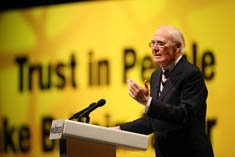Much ink has, of course, already been spilt about the Labour Conference. In the event, given all of the tension and the intense speculation surrounding Blair’s likely departure date, it was, for those of hoping for a real political splat, a bit of a damp squib! Gordon Brown confirmed that he will never be a particularly inspiring leader, for all his undoubted worthiness and political weight; John Prescott mangled the English language one more time and produced the startling revelation that, no, he would not be deputy leader in a year’s time – so thanks for clearing that up John; and Tony Blair did indeed put on a bravura performance in his last conference speech as leader, hamming up the emotion, choking on his own studied sincerity, and getting them all leaping in the aisles. Can’t really see Gordon ever doing that, but every time we feel a little disillusioned with the Iron Chancellor’s lack of emotion let’s just pause for a moment, and remember that if he had been Prime Minister over Blair, then we would have at least been spared all that “People’s Princess” crap.
And, just finished, of course, we had the new look Tories. Nice new logo – green oak tree to

remind us of environmentalism and England – and a fresh, bright web log for the leader – the Webcameron – with its reminder of Dave’s informal, regular, Eton guy’s style in his no-mortgage Notting Hill pad! Apart from Boris Johnson, the Tories’ licensed jester, and a bit of transatlantic glamour from John McCain, it is true that no-one was allowed to say anything of interest at the Tory conference, and they all duly complied. One policy issue capable of generating division emerged – the tax issue – but was confined to the sidelines. Cameron did, however, make a considered speech which, while lacking some of Blair’s genuinely brilliant audience connection, sought to set out a clear direction for the Tories and show that hey are back in the serious business of winning over public support. He also gave us a further glimpse into his ideology with a short passage on foreign affairs. Whilst affirming that he is not anti-American (like that one’s a surprise!), he said this:
“I'm not a neo-conservative. I'm a liberal Conservative. Liberal - because I believe in spreading freedom and democracy, and supporting humanitarian intervention. That is why we cannot stand by and watch further genocide in Darfur. But Conservative - because I also recognise the complexities of human nature, and will always be sceptical of grand schemes to remake the world. We need more patience, more humility in the way we engage with the world”
Cameron’s definitely getting there. He’s already taken the Tories to a feelgood po

int which has seemed beyond them for well over a decade, and his gradualist approach to developing policy seems to be the right one. After all, why give hostages to fortune now, with two or three years still to go before a likely election – the tax furore was a small indication of how damaging that could be. Set out a direction, establish some values, reconnect with the voting public – those are the wise aims of an Opposition Leader, and for all his gimics, Cameron has got his eye focused on that.
So there it is. A potentially historic, but actually rather tame, conference season. Gone, for now at any rate, are the days when Labour conferences would see the comrades tear each other apart over issues of extreme policy, the Liberals would pass motions that made the Greens look mainstream, and the Tories would be vigorously stabbing each other in the back at various fringe meetings. Dull, isn’t it?







